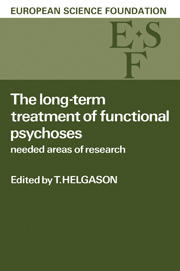Book contents
- Frontmatter
- Contents
- List of Participants
- Introduction
- I Organisational Aspects of Long-term Treatment
- II Patients Aspects of Long-term Treatment
- Needed are as of research in psychological treatments for functional psychoses
- Family therapy as part of the treatment of schizophrenia
- Milieu therapy in the long-term treatment offunctional psychoses: needed areas of research
- Long-term treatment of functional psychosis with neuroleptics
- Lithium and prophylaxis in manic-depressive illness
- New perspectives in psychopharmacology
- Research implications of recent trends in the treatment of schizophrenia
- Long-term treatment of functional psychoses in childhood and adolescence
- Functional psychosis in old age
- Chronicity and hospitalization: can the viciouscirclesbe broken?
- Social network and the long-term course of mental disorders - research needs
- III Public Health Aspectsof Long-term Treatment
- Index
Long-term treatment of functional psychosis with neuroleptics
from II - Patients Aspects of Long-term Treatment
- Frontmatter
- Contents
- List of Participants
- Introduction
- I Organisational Aspects of Long-term Treatment
- II Patients Aspects of Long-term Treatment
- Needed are as of research in psychological treatments for functional psychoses
- Family therapy as part of the treatment of schizophrenia
- Milieu therapy in the long-term treatment offunctional psychoses: needed areas of research
- Long-term treatment of functional psychosis with neuroleptics
- Lithium and prophylaxis in manic-depressive illness
- New perspectives in psychopharmacology
- Research implications of recent trends in the treatment of schizophrenia
- Long-term treatment of functional psychoses in childhood and adolescence
- Functional psychosis in old age
- Chronicity and hospitalization: can the viciouscirclesbe broken?
- Social network and the long-term course of mental disorders - research needs
- III Public Health Aspectsof Long-term Treatment
- Index
Summary
In many countries the period around 1950 was one in which preparations for great changes were being made within the big mental hospitals. These carried, as they largely do now, the major part of the burden of providing care to those chronically ill with psychotic disorders. Occupational rehabilitation programmes and the active resocialization of severely ill patients were introduced as fundamental parts of open-door policies. There was an increasing improvement in economic and personnel resources above the thresholds necessary simply for the provision of shelter and protection.
The qualities and organization of psychiatric rehabilitation programmes that were known before the drug era have been forgotten and rediscovered several times. The absence of effective modes of drug treatment itself leads to an evaluation of alternative methods of treatment. The importance of a continuous rehabilitation process for chronic psychotics which includes contact with work and family and with medical supervision has been emphasized and clearly demonstrated. The relative ineffectiveness of psychoanalytically oriented therapies has become evident. The value of integrated supportive psychotherapeutic strategies to strengthen motivation, independence and resistance to psychotic breakthrough is also generally accepted (May, 1968; Wing & Brown, 1970; Brown, Birley & Wing, 1972).
The advent of the specific psychopharmacological agents, especially neuroleptics, has greatly increased the possibilities open to mental health systems in the organization of much more efficient rehabilitation programmes for chronic psychoses. The unique properties of the drugs to reduce symptoms of schizophrenic psychosis have been determinant in the further development of our treatment programmes.
Over the last 30 years with neuroleptics, we have, nevertheless, forgotten much about the natural course of chronic psychoses and principles ofcare. We have been disappointed that neuroleptics do not offer total cure but only relief and at times the dependency of the effect we need on other therapeutic programmes has been neglected. The consequent negative attitude to drugs among laymen and even paramedical staff has led to unrealistic expectations over alternative treatment programmes, none of which is new; they are already ranked as more or less complementary measures in the total organization of mental health care of chronic psychoses.
It is necessary to adopt a historical perspective when trying to evaluate today's therapeutic principles and when designing new strategies for the treatment of chronic psychosis and research in the field.
- Type
- Chapter
- Information
- The Long-Term Treatment of Functional PsychosesNeeded Areas of Research, pp. 101 - 106Publisher: Cambridge University PressPrint publication year: 1985



